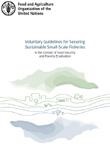Publications

Globefish Research Programme, Vol. 119: Executive Summary
20/05/2015
Women participate in all segments of the seafood industry, including fishing, farming, trading and selling, monitoring and administration. But the widespread lack of consideration for their role and work in the seafood industry is, in many respects, disadvantageous to them and ultimately bars them from participating fully and equitably in the industry. 8 pp.

Maximizing Women’s Participation in a Fisheries Livelihoods Project: The Philippine experience
11/05/2015
This case study describes the work of the Regional Fisheries Livelihood Programme (RFLP) in the Zamboanga del Norte province of the Philippines: the gender mainstreaming efforts and interventions, the results and gender impact of such interventions, success stories, lessons learned and recommendations for programme improvement and sustainability. 20 pp.

Dimitra Newsletter 26
31/03/2015
The Dimitra newsletter outlines the Dimitra project’s most recent activities and achievements, especially the development and growing impact of the listeners’ clubs. This edition discusses how Dimitra clubs in Senegal are helping contain the threat of Ebola, how 240 new clubs in Niger are in place as part of the struggle against climate change, and much more. 24 pp.

Gender Opportunities and Constraints in Inclusive Business Models – The case study of Unifrutti in Mindanao, Philippines
16/03/2015
Like many developing countries, the Philippines is making vigorous efforts to attract and facilitate private investment in agriculture with the expectation that such investment will contribute to production growth, poverty reduction and food security. The cases analysed in this report show that the investment models and contractual arrangements implemented by Unifrutti – a major private company producer, processor and exporter of pineapple and banana in the Mindanao Region – have had 84 pp.

Mainstreaming gender into forest policies in Asia and the Pacific
11/03/2015
This report documents key findings of a regional initiative on ‘Mainstreaming gender into forest policies of developing Asia-Pacific Forestry Commission (APFC) member countries,’ coordinated jointly by FAO and RECOFTC – The Center for People and Forests. 32 p.

Voluntary Guidelines for Securing Sustainable Small-Scale Fisheries in the Context of Food Security and Poverty Eradication
06/03/2015
These Voluntary Guidelines for Securing Sustainable Small-Scale Fisheries in the Context of Food Security and Poverty Eradication have been developed as a complement to the 1995 FAO Code of Conduct for Responsible Fisheries (the Code). They were developed to provide complementary guidance with respect to small-scale fisheries in support of the overall principles and provisions of the Code. 34 pp.

Gender Inequalities in Rural Employment: A country profile on Tanzania Mainland
24/09/2014
This country profile aims to contribute to a better understanding of the types and the degree of existing employment-related gender inequalities in rural settings of Tanzania Mainland. It also sheds light on existing inequalities in terms of access to productive resources – in particular land, time use patterns and educational conditions – recognizing their close correlation with labour productivity and income generating capacity. 64 pp.

Land and Gender: Improving data availability and use in the Western Balkans
12/09/2014
Although women and men in the Western Balkans have equal legal status in relation to property, gender disaggregated data shows that local customs, cultural norms, and traditions often prevail over laws. It is therefore not uncommon for women to lose their entitlements to male relatives. FAO and the World Bank ECA land team are working together to integrate gender equality principles into ongoing Land Administration projects and into the design of a new project in the Western Balkans. 4 pp.
